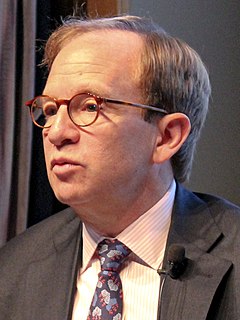A Quote by Alan Greenspan
Protectionism will do little to create jobs and if foreigners retaliate, we will surely lose jobs.
Quote Topics
Related Quotes
Of all the thankless jobs that economists set for themselves when it comes to educating people about economics, the notion that society is better off if some industries are allowed to wither, their workers lose their jobs, and investors lose their capital - all in the name of the greater glory of globalization - surely ranks near the top.
Twenty million jobs is what we call for in the Green New Deal, which is essentially a New Deal focused on greening the economy on an emergency basis. So it's 20 million jobs, which are mixed, private sector, nonprofits, government jobs where others will not do the job and will not create the employment.
Of all the wonderful things government says, that's always been just about my favorite. As opposed to if you get to keep the money. Because what you'll do is go out and bury it in your yard, anything to prevent that money from creating jobs. They never stop saying it.We will say, "This is expected to create x number of jobs." On the other hand, we never say that the money we removed from another part of the economy will kill some jobs.
For example, the supporters of tariffs treat it as self-evident that the creation of jobs is a desirable end, in and of itself, regardless of what the persons employed do. That is clearly wrong. If all we want are jobs, we can create any number--for example, have people dig holes and then fill them up again, or perform other useless tasks. Work is sometimes its own reward. Mostly, however, it is the price we pay to get the things we want. Our real objective is not just jobs but productive jobs--jobs that will mean more goods and services to consume.



































